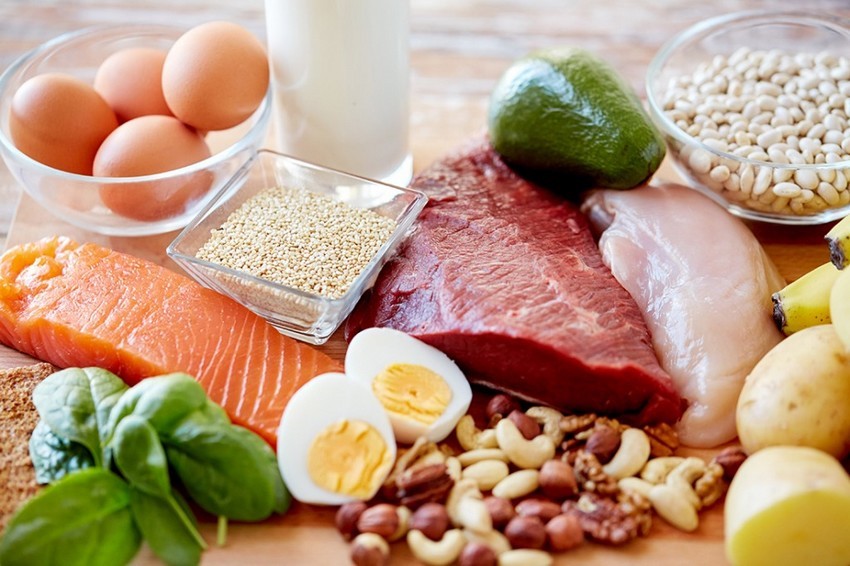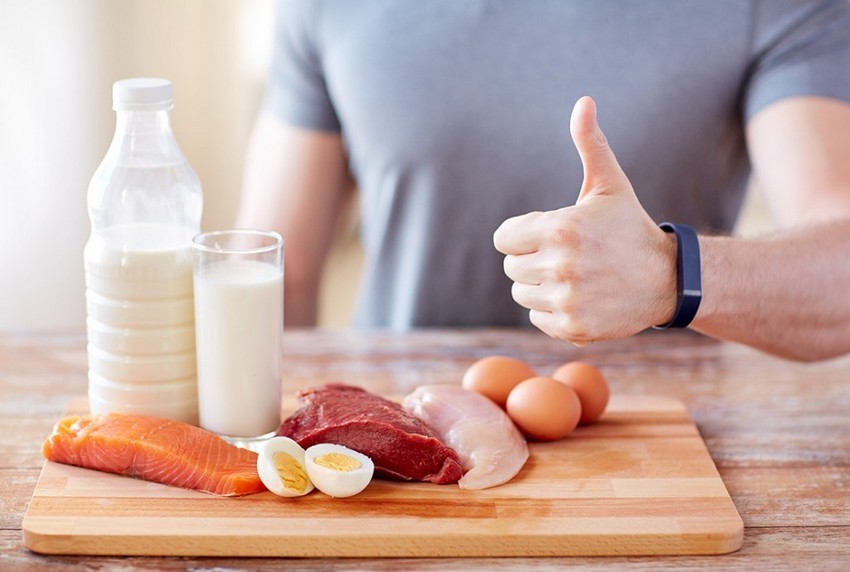Protein is one of the three most important nutrients that your body needs in order to function correctly. It ensures healthy muscle growth and also works to produce hormones. The list goes on and on! Now you can get in the know: learn which foods are high in protein, what role it plays in your body and how much of it you should be eating on a daily basis.
Protein is like as a house frame. This nutrient is essential for healthy bodily function. Chemically speaking, protein is made up of large molecules of 20 amino acids, whether it comes from animals, plants or bacteria. They are crucial for humans, because unlike carbohydrates, the human body can’t produce them on its own. The only way you can get them is through your food, so watch what you eat!
In addition to carbohydrates and fat, protein is part of the large group of macronutrients. They give you energy if case you run out of carbohydrates and fat. Each gram of protein provides your body with four calories of energy. For example, the daily recommendation is 1,800 calories for women and 2,100 calories for men. These are just examples and are not appropriate for everyone.

Protein is also crucial for your growth and the regeneration of cells like those found in your muscle tissue. In fact, it creates a protective barrier that you can strengthen if you start eating a balanced diet.
Everyone has their own individual protein needs. This depends on your weight and your level of physical activity. People who are physically active have a greater need for protein. Physical activity leads to higher protein intake because it helps your muscles properly recover and repairs micro-lesions caused by physical exertion. These micro-lesions use up additional protein, which then needs to be replaced.
It makes sense to say that people who live a sedentary lifestyle don’t have the same needs for protein as those who are physically active. For those who live a sedentary, or physically inactive, lifestyle, the Dietary Reference Intake (DRI) in protein is 0.8 g per kilogram of body weight per day. For those who are physically active and work out at least three times a week, their protein needs double. They need 1.5 to 1.7 g of protein per kilogram.
If you’re a physically inactive man who weighs 80 kg and works in an office, getting little exercise, your body will need 80 x 0.8 g = 64 g of protein every day.
On the other hand, if you’re physically active and also weigh 80 kg, your body will need about 80 x 1.5 to 1.7 g = 120 to 136 g of protein every day. Following this protein intake improves your health status and boosts the quality of your muscle fiber. But make sure to not exceed your daily quota. Too much protein can have adverse effects on your liver and kidneys. It’s all a matter of balance.
FizzUp tip: To meet your protein needs, you can also have a few healthy snacks throughout the day.
Eat complete and high-quality protein that comes from animals. Here’s the protein content per 100 g for the following foods:

Eggs are the best source of high-quality animal protein. The FizzUp trainer recommends having them for breakfast because they slow down the rate at which your body absorbs carbohydrates that you eat in the morning, prolonging the time it takes for you to digest it and lowering the glycemic index of these foods.
Red meat is an excellent source of iron. The quality of this mineral is higher when it comes from meat than from plants because meat contains heme protein, which is easier for your body to absorb. Red meat is also high in zinc, an element anyone who’s physically active absolutely needs to withstand physical exertion. A lack of zinc reduces your athletic performance. It’s also an excellent source of vitamin B12, which helps your body create red blood cells.
White meat, such as chicken and turkey, is low in calories. It’s also high in vitamins and trace elements such as zinc. Dairy products, such as yogurt, are another source of protein. Combine these different protein sources with spring fruits and vegetables for a healthy and balanced diet.
As a nutrition reminder: Make sure to eat up to 500 g of meat per week.
Foods that are high in protein derived from plants are a perfect way to complete your diet when you’re physically active. Here’s the protein content per 100 g for the following foods:
If you’re vegetarian, intolerant to animal protein or want to eat a more balanced diet, eat grains and pulses to get a sufficient intake of protein and other essential nutrients. Make smart choices about how to combine your sources of plant-based protein so that they complement each other: rice and lentils, corn and navy beans or kidney beans, etc.
Now you’re a protein expert! Balancing your diet and getting your daily intake of protein should now be a walk in the park. What’s your favorite snack that’s high in protein?
Join the 7 million users already registered on FizzUp
Join us